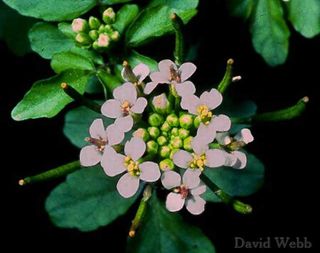Plants Shun Parents' Faulty Genes

Challenging a scientific law of inheritance that has stood for 150 years, scientists say plants sometimes select better bits of DNA in order to develop normally even when their predecessors carried genetic flaws.
The conclusion by Purdue University molecular biologists contradicts at least some basic rules of plant evolution that were believed to be absolute since the mid-1800s since Austrian monk Gregor Mendel initially experimented with peas and saw that traits are passed on from one generation to the next. Mendelian genetics has been the foundation of both crop hybridization and the understanding of basic cell mutations and trait inheritance.
In the Purdue experiment, researchers found that a watercress plant sometimes corrects the genetic code it inherited from its flawed parents and grows normally like its grandparents and other ancestors.
Scientists said the discovery raises questions of whether humans also have the potential for avoiding genetic flaws or even repairing them, although they said the actual proteins responsible for making these fixes probably would be different in plants.
Details of the experiments appear in Thursday's issue of the journal Nature.
''This means that inheritance can happen more flexibly than we thought,'' said Robert Pruitt, the paper's senior author.
In the experiment, the Purdue researchers found that in 10 percent of watercress plants with two copies of a mutant gene called ''hothead'' didn't always blossom with deformed flowers like their parents, which carried the mutant genes. Instead, those plants had normal white flowers like their grandparents, which didn't carry the hothead gene and the deformity appeared only for a single generation.
Sign up for the Live Science daily newsletter now
Get the world’s most fascinating discoveries delivered straight to your inbox.
The normal watercress plants with hothead genes appear to have kept a copy of the genetic coding from the grandparent plants and used it as a template to grow normally.
However, Pruitt's team didn't find the template in the plants' DNA or chromosomes where genetic information is stored and they did not determine whether a particular gene is encoded to carry out the recovery of the normal DNA.
Where the normal genetic template is stored and how it is triggered will take additional research and probably involve more genes, Pruitt said.
Humans and other animals do not carry the hothead gene, so if this process occurs in higher organisms it must use a different trigger, he said.
Other scientists described the results as ''spectacular.''
Detlef Weigel and Gerds Jurgen of the Max Planck Institute for Developmental Biology in Germany wrote in an accompanying commentary in Nature that the mechanism for recovering the normal DNA in the watercress plants might be lurking in the plant's RNA, which carries out genetic orders in cells.
